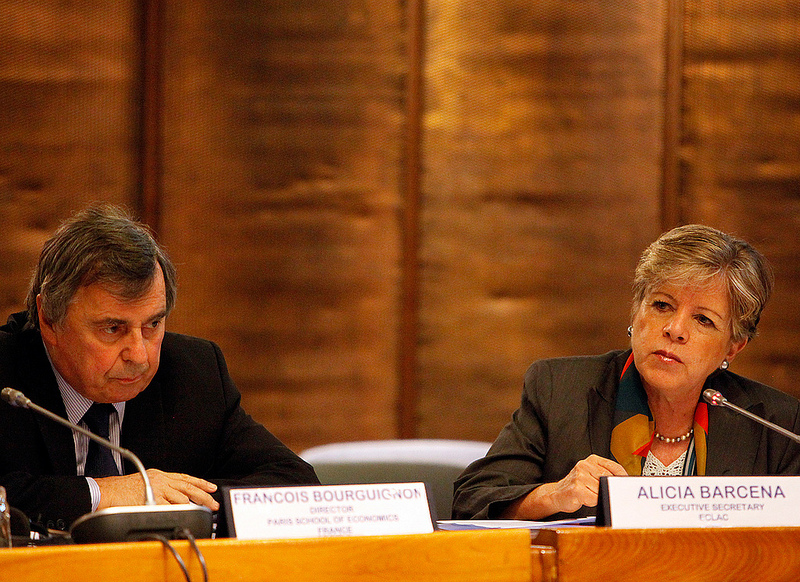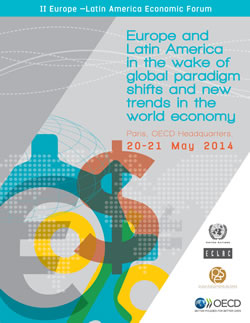Economists from Latin America and the European Union Share Their Visions on the Future of the Two Regions
Work area(s)
The event is taking place as part of the 1st CELAC-EU Summit being held this weekend in Chile.

(21 January 2013) Renowned Latin American and European economists met at the headquarters of the Economic Commission for Latin America and the Caribbean (ECLAC) in Santiago, Chile, to discuss the opportunities and challenges of the biregional relationship in the current scenario of international turmoil.
The event is taking place as part of the 1st Summit of the Community of Latin American and Caribbean States and the European Union (CELAC-EU), which will bring together representatives from 60 countries on 26 and 27 January in the Chilean capital.
The LAC-EU Economic Forum 2013: Globalization, International Trade and the Welfare State at Crossroads: Converging Views in European and Latam countries? was opened on Monday 21 January by Alicia Bárcena, Executive Secretary of ECLAC, and François Bourguignon, Director of the Paris School of Economics.
According to Alicia Bárcena "Latin America is in a positive state of mind, despite the turmoil in the world economy. The region is learning from the past and trying new paths. The Latin American foreign debt crisis happened 30 years ago, and led to a lost decade for the region. We are worried that the same may happen in Europe" .
The ECLAC leader added that "the South is no longer the same. Europe will see a different Latin America, because the region has changed. This implies tackling new global challenges responsibly, and making commitments on issues such as climate change and financial security".
François Bourguignon described the first LAC-EU Economic Forum as a space for reflection aimed at identifying and sharing lessons learned, as well as reaching common visions on issues relevant to both regions, such as international financial governance.
He also emphasized that the Forum, which ends on Tuesday 22 January, is also an opportunity for Latin American and European economists to ask questions and send messages to countries participating in the 1st CELAC-EU Summit.
The Economic Forum was jointly organized by ECLAC and the Paris School of Economics, with support from the French Foreign Affairs Ministry. Other contributors include the German Federal Ministry for Economic Cooperation and Development and the France-based Institute for the Americas (IDA). Sponsors include the EU-LAC Foundation and the Latin American Centre for Relations with Europe (CELARE).
In his address, Mr. Bourguignon compared trends in a few key indicators for both regions in recent decades, including GDP growth rate, share of exports in GDP and the Gini coefficient measuring inequality.
According to the Director of the Paris School of Economics, while inequality has fallen in Latin America and the Caribbean in recent years, it is on the rise in Europe. He also referred to the role of social protection policies in this regard.
Ms. Bárcena stated that, although the European Union is the main direct investor in Latin America and the Caribbean and the second main trading partner, the biregional relationship has stood still in recent years due to several factors.
These include the dramatic economic crisis affecting some European countries, the new position of China, the incorporation of new Member States to the European Union and the growing relevance of the Middle East and North Africa in the European foreign agenda.
In this sense, the ECLAC Executive Secretary appreciated the holding of the First CELAC-EU Summit to analyse the type of relationship that can be built to face the future. She added that this meeting is also "a very important step towards one of ECLAC's most cherished dreams: regional integration".
The two days of the Forum - which hopes to become a new high-level space for biregional dialogue- will feature discussions on topics such as asymmetries in economic policy responses, trade imbalances, industrial development and environmental issues, and the future of the welfare state. Some policy proposals will also be put forward.
See also:
Any queries should be sent to the ECLAC Public Information and Web Services Section.
E-mail: prensa@cepal.org, Telephone: (56 2) 2210 2040.
Follow us on: Twitter, Facebook, Flickr and YouTube.
Related content

La CEPAL, la OCDE y la Escuela de Economía de París organizan Foro sobre América Latina y Europa
La Secretaria Ejecutiva de la CEPAL, Alicia Bárcena, participará en la inauguración del encuentro.

Country(ies)
- Latin America and the Caribbean
- European Union
Related project(s)
Contact
Public Information Unit
- prensa@cepal.org
- (56 2) 2210 2040
